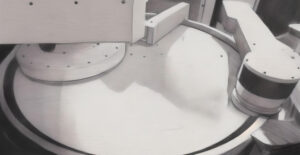
Unveiling the microstructure of metals requires meticulous surface preparation. Metallographic polishing, employed in fields like materials science and engineering, achieves this by creating a flawless, scratch-free surface for microscopic analysis.
Traditionally, various abrasive materials and polishing techniques have been employed such as Colloidal silica for its dispersion ability.
Nowadays, alumina materials are prefered for polishing soft metals, offering enhanced results and processability.
The Superior performance of Baikalox® Alumina for Aluminum and Copper Alloys
The results here are based on the comparative performance of our Baikalox® fine alumina versus traditional colloidal silica in finishing polishing of aluminum alloys and copper samples.
Our fine alumina polishing solutions offer a compelling alternative in terms of :
1. Surface Finish Quality
High-resolution SEM images allowed for detailed observation of surface topography, revealing the absence of scratches, pits, and orange peel effects with Baikalox® polishing.
- Scratch-free: The uniform particle size and high specific surface area of the Baikalox® solutions contributed to a better consistent and controlled material removal than colloidal silica, preserving the integrity of the microstructure for accurate analysis.
- Orange Peel Effect-free: This is a common challenge encountered with colloidal silica, where uneven polishing creates a wavy surface reminiscent of an orange peel. Baikalox®, with its higher polishing efficiency offered a superior flatness and surface finish
2. Time Reduction
The use of fine alumina significantly reduced the overall polishing time thanks to its enhanced abrasive action, which facilitates faster material removal without compromising surface quality.
3. Ease of Cleaning
Colloidal silica suspensions can be challenging to clean. On the contrary, the alumina particles were less prone to embedding in the sample surface, reducing the need for extensive cleaning procedures, promoting faster sample turnaround times and minimizing the risk of residual contamination.
Optimized Techniques for Metallographic Polishing
The metallographic polishing workflow typically includes sectioning, mounting, grinding, and polishing. Polishing is generally divided into two main stages:

- Coarse Polishing: Also known as raw polishing, this initial phase removes bulk surface irregularities and prepares the sample for fine finishing. For this step, Baikowski® offers Baikalox® DF500S, a corundum slurry formulated in the USA with fused alumina and GE1 alpha alumina. Corundum’s high hardness and angular morphology enable efficient and aggressive material removal, making it ideal for early-stage metal surface preparation.
- Finishing Polishing: This final stage aims to achieve a flawless, mirror-like surface suitable for accurate microstructural analysis. Baikowski®’s Baikalox® CR30F, BA105, and BP12MAR powders are particularly suited for soft metals such as aluminum and copper. Other Baikalox® references—such as GE6, GE15, CR16, and CR15—as well as diamond-based formulations, can be selected depending on the metal type and polishing step.
Please contact our experts to identify the most suitable product for your specific needs.
Our evaluations here have been carried out on soft metals using mechanical polishing systems. The process involves progressively finer abrasives, typically following an initial corundum or diamond grinding stage.
Metallography applications
Metal polishing and metallograhy are crucial across diverse industries and research fields that demand precise material characterization and analysis, including:
- Aerospace and Automotive: Ensuring the integrity and performance of critical components.
- Electronics and Semiconductor Manufacturing: Facilitating the development of advanced materials and the assessment of microstructural properties.
- Biomedical: Supporting the development and quality control of metallic implants and devices.
- Watchmaking: Ensuring the quality and aesthetic appeal of metal components in watches, contributing to both durability and visual appeal.
Need help selecting the right Baikalox® product? Contact us!
Our experts will provide tailored advice to ensure you achieve the highest quality and precision in your metallographic preparations. Let’s innovate together!
Do not hesitate to have a look to our White Paper about our Solutions for superior intermediate and final polishing
